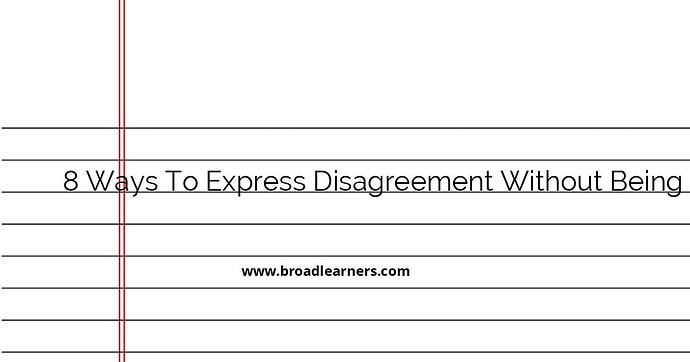When engaging in discussions or debates, it's common for people to have differing opinions or viewpoints. However, it's important to express disagreement in a respectful and constructive manner without being disagreeable or causing unnecessary conflict.
Here are eight ways you can express disagreement without being disagreeable:
- Use polite language: Instead of using aggressive or confrontational language, use polite and respectful words to express your disagreement. For example, instead of saying 'That's a terrible idea', you can say 'I understand where you're coming from, but I have some concerns about that approach.'
- Provide evidence or examples: When expressing your disagreement, back it up with evidence or examples to support your viewpoint. This helps to show that your disagreement is based on logical reasoning rather than personal bias. For instance, you can say 'Based on the data we've gathered, I think there might be a more effective solution.'
- Listen actively: Before expressing your disagreement, make sure to actively listen to the other person's viewpoint. This shows that you respect their opinion and value their input. Repeat what they've said to ensure you've understood their perspective correctly.
- Acknowledge common ground: Find common ground or points of agreement with the other person before expressing your disagreement. This demonstrates that you're not completely dismissing their viewpoint and are open to finding common understanding. For example, you can say 'I agree that we need to address the issue, but I have a different approach in mind.'
- Ask questions: Instead of directly contradicting someone, ask questions to better understand their reasoning and to make them think deeper about their viewpoint. This allows for a more productive and informative discussion. For instance, you can ask 'What led you to that conclusion?' or 'Can you provide more details about your thought process?'
- Use 'I' statements: Express your disagreement using 'I' statements to make it clear that you're stating your own perspective rather than attacking or criticizing the other person. This helps to keep the conversation focused on the topic rather than turning it into a personal attack. For example, you can say 'I see things differently' or 'I have a different perspective on this matter.'
- Suggest alternatives: Instead of simply disagreeing, offer alternative solutions or suggestions that could potentially address the concerns or issues you have. This shows that you're actively contributing to the conversation and are interested in finding a resolution. For example, you can say 'Have we considered trying a different approach that may yield better results?'
- Keep emotions in check: It's important to keep your emotions in check during a disagreement. Avoid becoming defensive, angry, or aggressive. Remember to stay calm, composed, and respectful throughout the discussion.
By following these eight ways, you can express disagreement in a constructive and respectful manner. This allows for healthier and more productive discussions and debates while maintaining positive relationships with others.
Did I miss anything? Respond below
